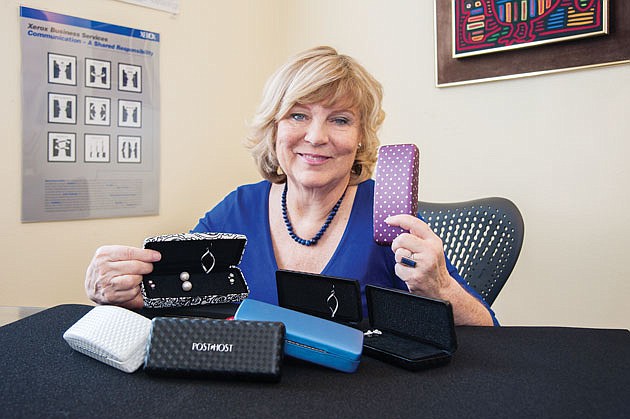- November 23, 2024
-
-
Loading

Loading

Linda Keefe traveled two to four times a month when she was communications manager for one of Xerox's global divisions.
She went to worksites across the U.S. and Europe, talking with employees and hosting round-table discussions. It was important to her to look her best — the perfect suit, the perfect accessories. Especially earrings.
But she had a problem. With no good way to pack her earrings, they kept getting broken and lost in transit. So she got to work on a solution.
Keefe found a small plastic box she could use as a case to protect earrings in suitcases or purses. She searched for something to go inside the case to hold earrings in place. She settled on pieces of foam, nestled inside. The Post Host was born.
“The biggest challenge was finding the foam,” Keefe says. She had to have foam that would hold an earring firmly and “self-heal” from holes so it could be used repeatedly and still look fresh.
She went to foam experts in manufacturing, distributing and academia, searching for the right material. After years of searching, she found something. “This foam was like finding a needle in a haystack,” she says.
For more than 20 years, Keefe's earring holder has been a side passion. But now she's ready to see how far she can take it as a full-on business.
Her goal? Grow The Post Host enough to have someone like Lori Greiner — entrepreneur, inventor and star of the ABC television series “Shark Tank” — buy it.
Following advice Greiner offers in a book, Keefe is gathering 1,000 survey responses about The Post Host. The list includes insights on how much people like the product, what could be done to improve it and whether people would buy it for themselves or others. She's also collecting price point data, asking at what point the product would be too expensive or too cheap.
She'll use the data she's gathering to improve The Post Host. “What we have to do now as a business is refine the product,” she says, “so everyone who sees it wants it.”
Two years ago, Keefe launched a crowd-funding campaign on Kickstarter, for a test more than a capital raise, and offered The Post Host to people who invested in the company. The campaign was successful, and it allowed Keefe to test the market while making a little bit of money. Keefe also learned from the experience, realizing she needed to find a better case to be more appealing to the average customer.
After she went to a national eyewear show, Keefe found new cases for The Post Host. Now she offers eight products in different sizes and colors, ranging in price from $14.95 to $24.95. She also sells foam separately, so customers can use it in their drawers and jewelry boxes.
She says the improved appearance, launched around last Christmas, will lead to improved sales. Keefe declines to disclose revenue figures, but she says sales tripled from 2016 to 2017. Over 75% of customers buy multiple Post Hosts, Keefe says, averaging 3.5 items per sale.
A key sales lesson Keefe learned is that it doesn't sell well when it sits on a shelf. Sales at a gift shop were underwhelming — possibly from lack of customer education. “Some products just need demonstrating,” says Keefe.
That's why online sales are so important. On The Post Host website, currently the only place where the products are available, potential customers can watch videos that show how the product works.
The next step for The Post Host, Keefe says, is nailing down its audience, including specific groups, such as women preparing to take a cruise. Then the plan is to go into full production. Or, if the right offer were made, Keefe would sell The Post Host.
Keefe has invested about $50,000 in The Post Host, everything from business trips to prototypes. She shies away from the inventor label, instead preferring to call herself a problem-solver. She says, “It's all about solving problems in innovative ways instead of the tried-and-true.”